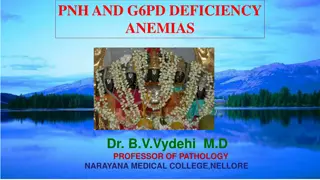Understanding Erythrocyte Sedimentation Rate (ESR)
Erythrocyte Sedimentation Rate (ESR) is a crucial indicator used in diagnosing and monitoring various health conditions. It measures the rate at which red blood cells settle in a test tube, providing insights into inflammation, infections, anemias, and other diseases. Factors affecting ESR include t
4 views • 24 slides
Iron Deficiency Anemia in a 78-Year-Old Man: A Case Study
A 78-year-old man presents with symptoms of fatigue, headache, and abdominal pain, leading to a diagnosis of iron deficiency anemia. His medical history includes hypertension, type II diabetes, and chronic shoulder pain. Investigations reveal hypochromic, microcytic anemia with low iron levels and h
0 views • 117 slides
Understanding Hypochromic Anemias: Background, Diagnosis, and Key Findings
Anemia is characterized by a decrease in hemoglobin levels below normal, leading to various symptoms and signs. This article explores the background, definition, and causes of hypochromic anemias, along with a diagnostic algorithm and key laboratory findings essential for diagnosis. Clinical feature
1 views • 26 slides
Red Cell Teaching Cases: Anemia Evaluation and Differential Diagnosis
Course Directors Breakfast session at ASH 2012 highlighting various aspects of red cell disorders, including case discussions, laboratory findings, and clinical considerations. Case 1 involves a 35-year-old woman presenting with anemia symptoms, requiring detailed evaluation and management. The sess
0 views • 70 slides
Understanding Paroxysmal Nocturnal Hemoglobinuria (PNH) and G6PD Deficiency Anemias
Paroxysmal Nocturnal Hemoglobinuria (PNH) is a rare acquired disorder causing hemolytic anemia due to red cell membrane defects, leading to increased sensitivity to complement. On the other hand, G6PD Deficiency is a genetic condition causing hemolytic anemia due to impaired function of the G6PD enz
0 views • 12 slides
Understanding Anemia: Causes, Types, and Prevention
Anemia occurs when there are not enough red blood cells in the body, leading to symptoms like fatigue, rapid heartbeat, and pale skin. Causes include nutrient deficiencies, interfering substances, and poor environmental conditions. Different types of anemia such as hypochromic, megaloblastic, and di
0 views • 17 slides
Understanding Erythrocyte Indices and Anemia Types
Erythrocyte indices such as MCV, MCH, and MCHC are essential parameters in diagnosing various types of anemia. This information-rich content explains how these indices are calculated and their significance in identifying conditions like normocytic/normochromic, microcytic/hypochromic, and macrocytic
0 views • 5 slides






